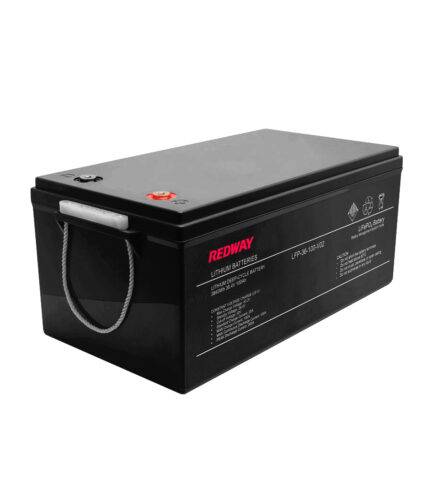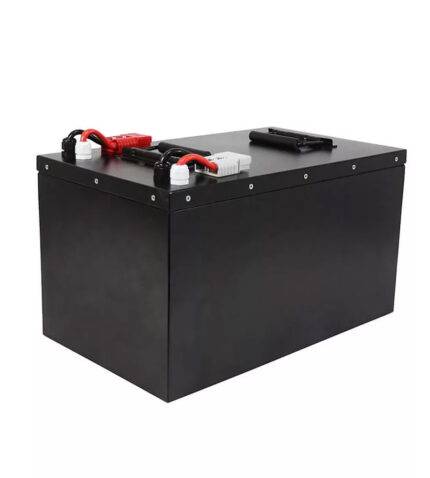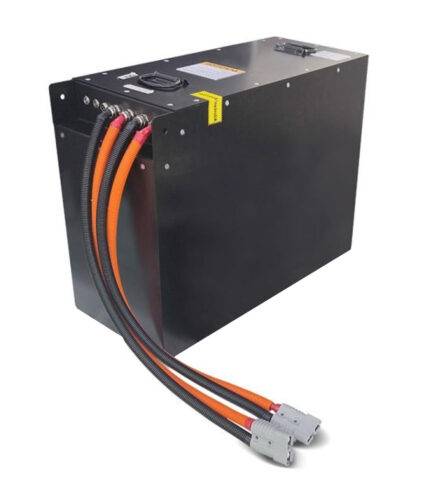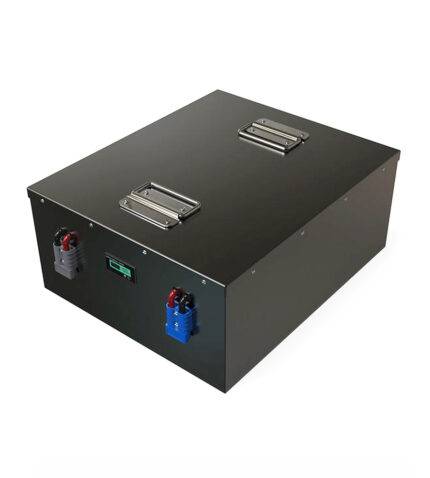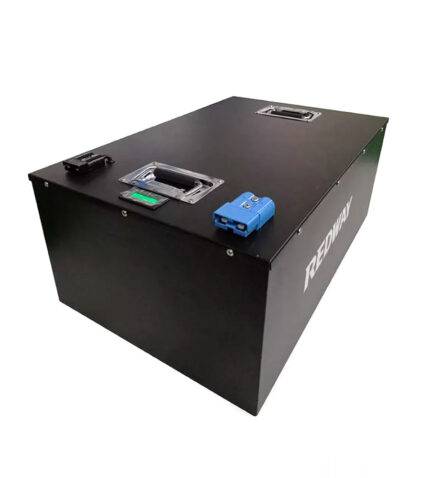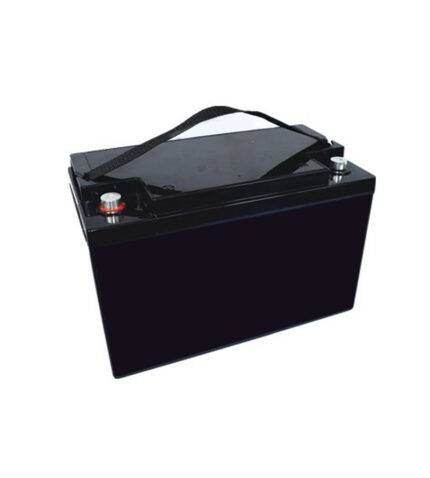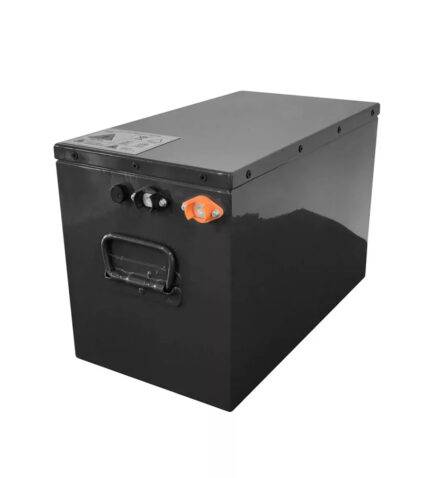- Forklift Lithium Battery
-
48V
- 48V 210Ah
- 48V 300Ah
- 48V 420Ah (949 x 349 x 569 mm)
- 48V 420Ah (950 x 421 x 450 mm)
- 48V 456Ah
- 48V 460Ah (830 x 630 x 590 mm)
- 48V 460Ah (950 x 421 x 450 mm)
- 48V 460Ah (800 x 630 x 600 mm)
- 48V 460Ah (820 x 660 x 470 mm)
- 48V 500Ah
- 48V 560Ah (810 x 630 x 600 mm)
- 48V 560Ah (950 x 592 x 450 mm)
- 48V 600Ah
- 48V 630Ah
-
48V
- Lithium Golf Cart Battery
- 12V Lithium Battery
12V 150Ah Lithium RV Battery
Bluetooth App | BCI Group 31
LiFePO4 Lithium
Discharge Temperature -20°C ~ 65°C
Fast Charger 14.6V 50A
Solar MPPT Charging - 24V Lithium Battery
- 36V Lithium Battery
- 48V Lithium Battery
-
48V LiFePO4 Battery
- 48V 50Ah
- 48V 50Ah (for Golf Carts)
- 48V 60Ah (8D)
- 48V 100Ah (8D)
- 48V 100Ah
- 48V 100Ah (Discharge 100A for Golf Carts)
- 48V 100Ah (Discharge 150A for Golf Carts)
- 48V 100Ah (Discharge 200A for Golf Carts)
- 48V 150Ah (for Golf Carts)
- 48V 160Ah (Discharge 100A for Golf Carts)
- 48V 160Ah (Discharge 160A for Golf Carts)
-
48V LiFePO4 Battery
- 60V Lithium Battery
-
60V LiFePO4 Battery
- 60V 20Ah
- 60V 30Ah
- 60V 50Ah
- 60V 50Ah (Small Size / Side Terminal)
- 60V 100Ah (for Electric Motocycle, Electric Scooter, LSV, AGV)
- 60V 100Ah (for Forklift, AGV, Electric Scooter, Sweeper)
- 60V 150Ah (E-Motocycle / E-Scooter / E-Tricycle / Tour LSV)
- 60V 200Ah (for Forklift, AGV, Electric Scooter, Sweeper)
-
60V LiFePO4 Battery
- 72V~96V Lithium Battery
- Rack-mounted Lithium Battery
- E-Bike Battery
- All-in-One Home-ESS
- Wall-mount Battery ESS
-
Home-ESS Lithium Battery PowerWall
- 24V 100Ah 2.4kWh PW24100-S PowerWall
- 48V 50Ah 2.4kWh PW4850-S PowerWall
- 48V 50Ah 2.56kWh PW5150-S PowerWall
- 48V 100Ah 5.12kWh PW51100-F PowerWall (IP65)
- 48V 100Ah 5.12kWh PW51100-S PowerWall
- 48V 100Ah 5.12kWh PW51100-H PowerWall
- 48V 200Ah 10kWh PW51200-H PowerWall
- 48V 300Ah 15kWh PW51300-H PowerWall
PowerWall 51.2V 100Ah LiFePO4 Lithium Battery
Highly popular in Asia and Eastern Europe.
CE Certification | Home-ESS -
Home-ESS Lithium Battery PowerWall
- Portable Power Stations
60V 50Ah Lithium Battery
• Cell: LiFePO4
• MOQ: 10
• Delivery: 20 Days
• Customizable / OEM / ODM: Yes
• Factory: Redway, Dongguan, Guangdong, China
• Delivery Terms: FOB, EXW, CIF
• Payment: T/T, L/C, PayPal
• Sea / Air / Land Shipment: 10FT, 20FT, 40FT, 60FT
Description
This battery is the 60V 50Ah Lithium Battery, produced by Redway Power, a reputable manufacturer based in China specializing in high-quality lithium-ion batteries. Designed with advanced LiFePO4 technology, this battery provides reliable and efficient power solutions for various applications, including electric scooters, e-rickshaws, and automated guided vehicles (AGVs).
Key Features
- High Energy Density: With a nominal capacity of 50Ah and an energy output of 3,040Wh, this battery is perfect for powering demanding applications that require sustained energy.
- Robust Protection: Featuring an IP66 rating, this battery is fully protected against dust and water, making it ideal for outdoor use and harsh environments.
- Long Cycle Life: Designed to last over 4,000 cycles at 80% depth of discharge (DOD), this battery minimizes the need for frequent replacements, providing excellent value over time.
- Smart Battery Management System (BMS): Equipped with an intelligent BMS that protects against overcharging, overheating, and short circuits, ensuring safe operation during use.
- Customizable Options: As an OEM provider, Redway Power offers customization options to meet specific requirements for dimensions and features.
Applications
The 60V 50Ah Lithium Battery is versatile and ideal for a variety of applications, including:
- Electric scooters
- E-rickshaws and e-trishaws
- Electric motorcycles
- Sweepers and floor cleaning machines
- Golf carts
- Low-speed vehicles (LSVs)
- Automated Guided Vehicles (AGVs)
With a maximum charging voltage of 69.3V and a discharge cut-off voltage of 47.5V, this battery is optimized for various operational needs. It operates effectively across a temperature range from -20°C to 65°C, making it adaptable to different environments.The compact design allows for easy installation while ensuring that your equipment operates efficiently throughout the day. Additionally, it supports fast charging capabilities, enabling quicker turnaround times between uses.
As a trusted factory in China, Redway Power is committed to delivering high-quality lithium-ion batteries that enhance productivity and sustainability in your operations. The 60V 50Ah Lithium Battery not only reduces downtime but also contributes to lower operational costs due to its efficiency and long lifespan.Investing in this battery means choosing a reliable power solution that meets the demands of modern electric vehicles while supporting your business’s growth and sustainability goals. Choose Redway Power for your lithium battery needs and experience unparalleled performance and service.
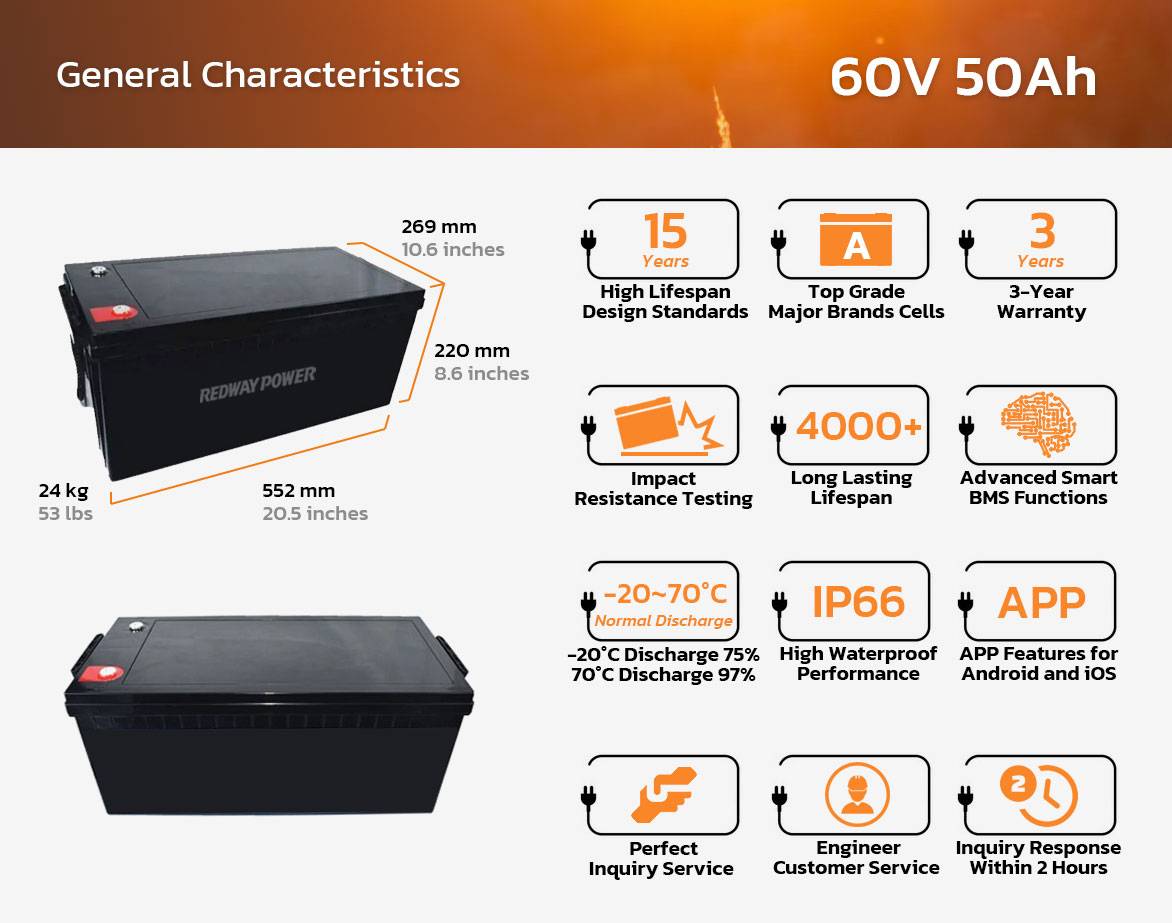
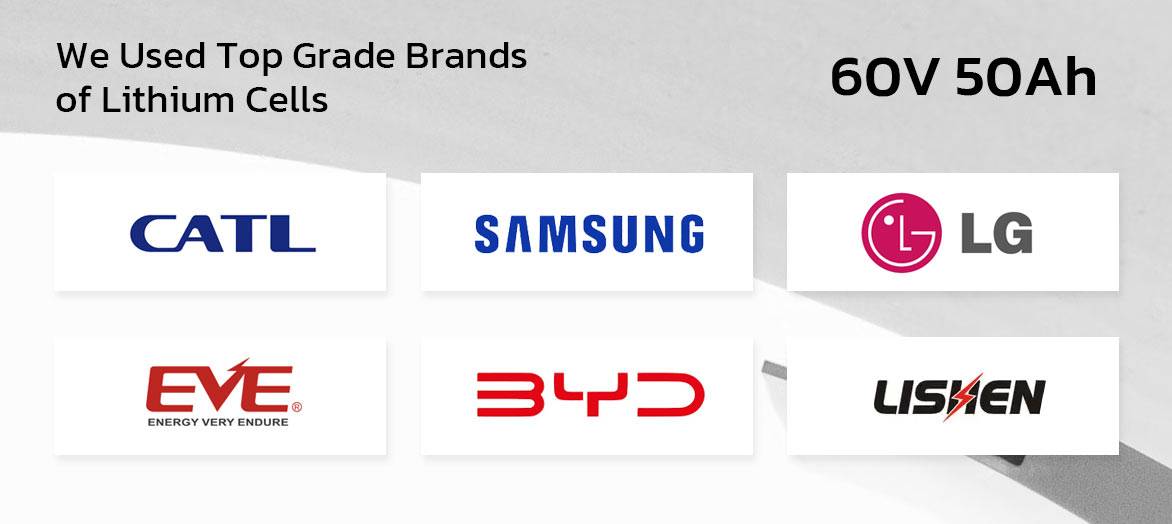
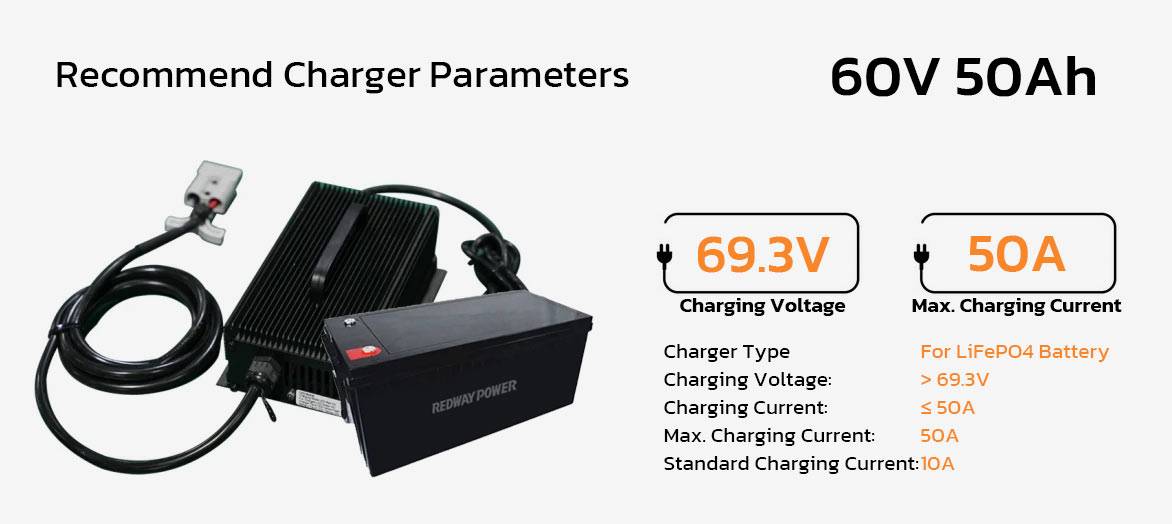
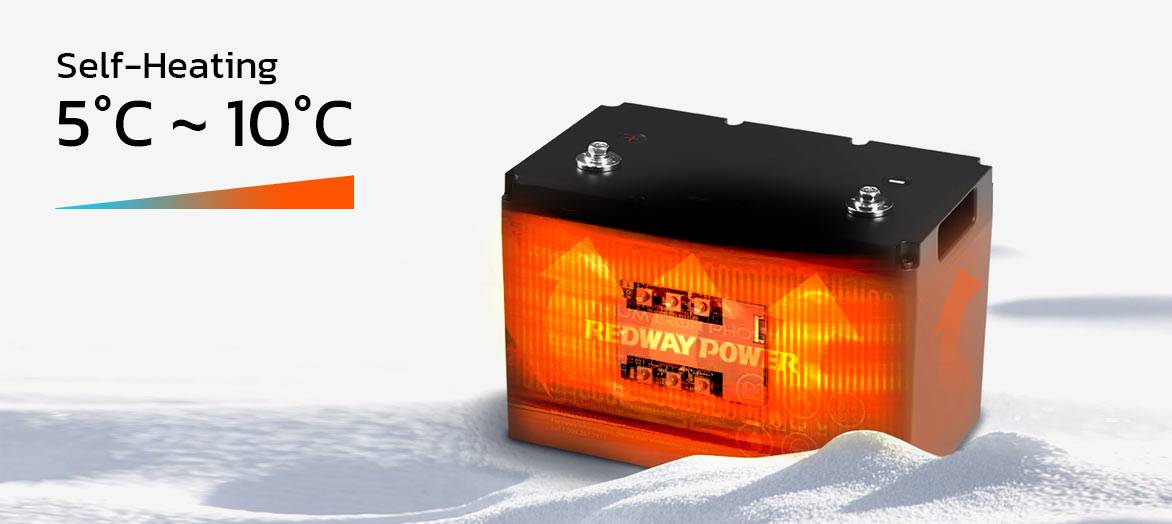
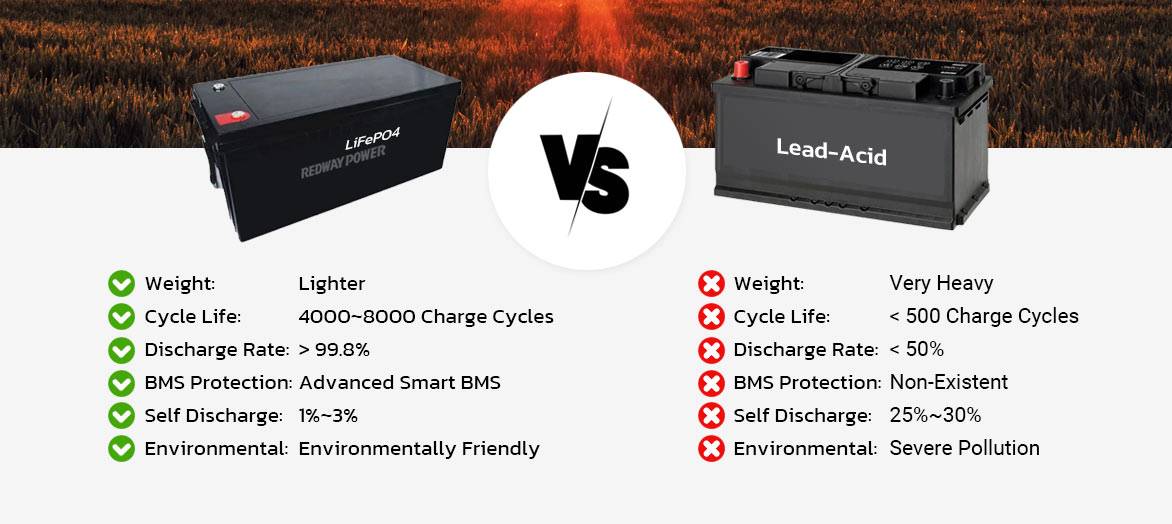
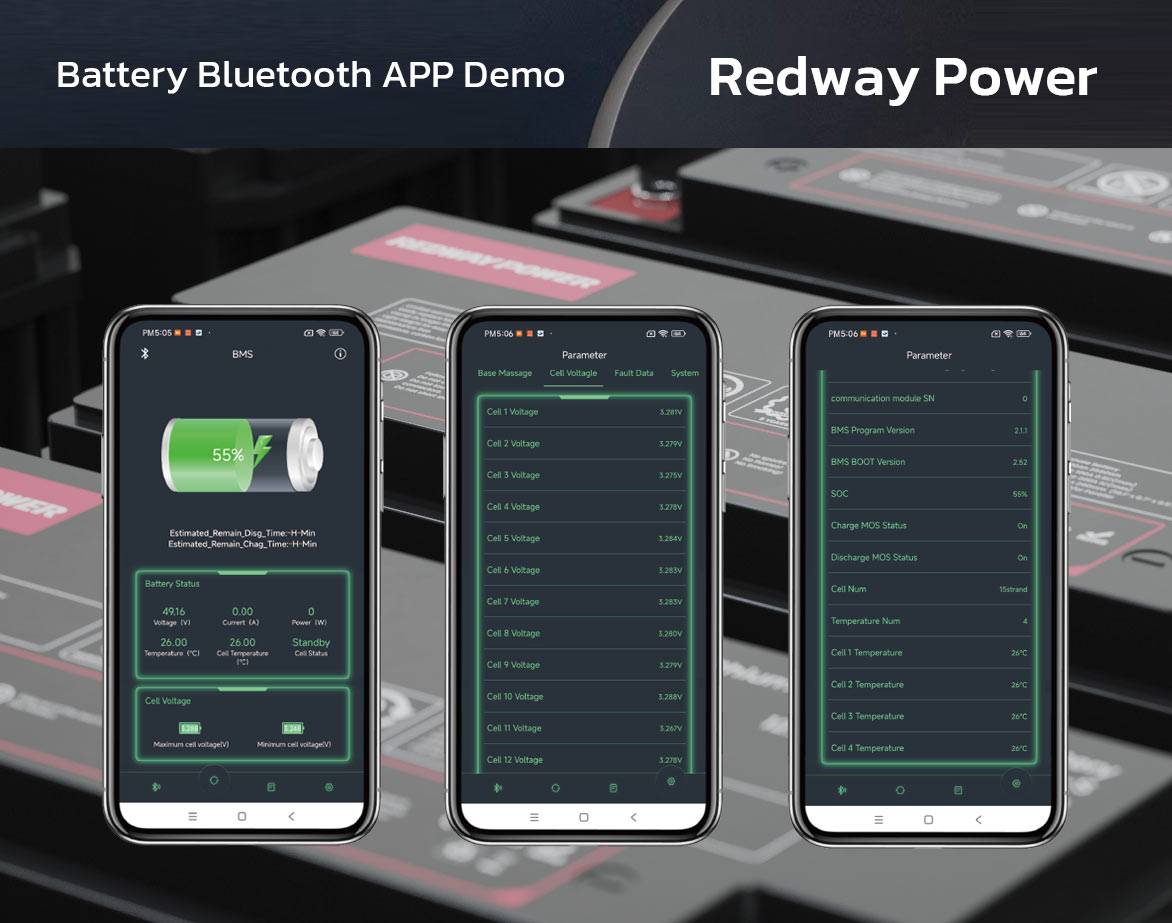
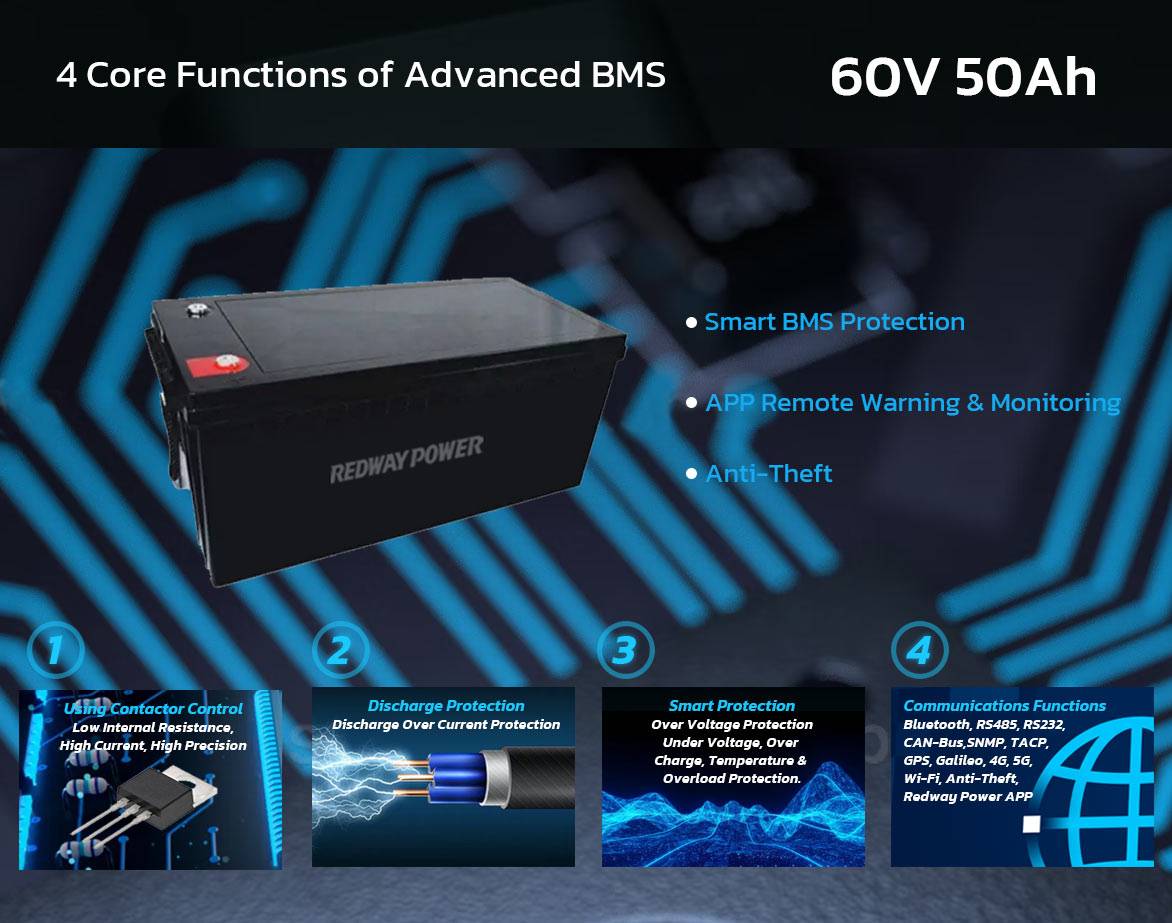
Specifications
Download 60V 50Ah Datasheet
Note: Our products are customizable, allowing customers to modify the main data according to their requirements.
| 60V50Ah | Specifications |
|---|---|
| Cell Type | LiFePO4 |
| Nominal Voltage | 60.8V |
| Nominal Capacity | 50Ah |
| Nominal Energy | 3040Wh |
| Charge Voltage | 69.3V |
| Discharge Voltage | 47.5V |
| Standard Charging Current | 10A |
| Max. Continues Charge Current | 50A |
| Max. Continues Discharge Current | 50A |
| Peak Discharge Current | 150A (5 Sec) |
| Charger | Fast Charger / CC / CV |
| Dimensions [L x W x H] |
522 x 269 x 220 mm 20.5 x 10.6 x 8.6 inch |
| Weight | 24 kg 53 lbs |
| IP Rating | IP66 (More request) |
| Cycle Life | >4000 cycles (DOD 80%) |
| Self-Discharge | 3% (Per month) |
| Charge Temperature | 0°C ~ 60°C 32°F ~ 140°F |
| Discharge Temperature | -20°C ~ 65°C -4°F ~ 149°F |
| Optional Functions | Bluetooth / WiFi / LCD / LED Touch Screen / RS485 / RS232 / CAN / 4G, 5G / GPS / APP |
| BMS | Intelligent BMS protection |
| Terminal | M6 / M8 |
| Battery Case | ABS |
| Design Life | 10 Years |
| Warranty | 3 Years |
| Silk-Screen / Label Printing | Yes |
| User Manual / Warranty Card | Yes |
| Customization / OEM / ODM | Yes |
| Shipment | Yes |
| Certifications | IEC, UN38.3, MSDS (More request) |
Applications and FAQs
Lithium iron phosphate (LiFePO4) batteries have revolutionized deep cycle battery usage. With a lifespan of 4000 cycles compared to traditional sealed lead-acid (SLA) batteries' 500 cycles, they offer superior longevity and cost-effectiveness. Their reliability, long-lasting performance, lightweight design, and compactness make them highly sought-after for diverse applications like home alarms, camping, and solar lighting.
What is a 60V 50Ah lithium battery?
A 60V 50Ah lithium battery, with lithium iron phosphate chemistry, offers stable, safe, and long-lasting power. It finds applications in electric vehicles, solar systems, and more. Its 60V voltage and 50Ah capacity make it versatile for industrial, commercial, and residential use, providing reliable energy storage.
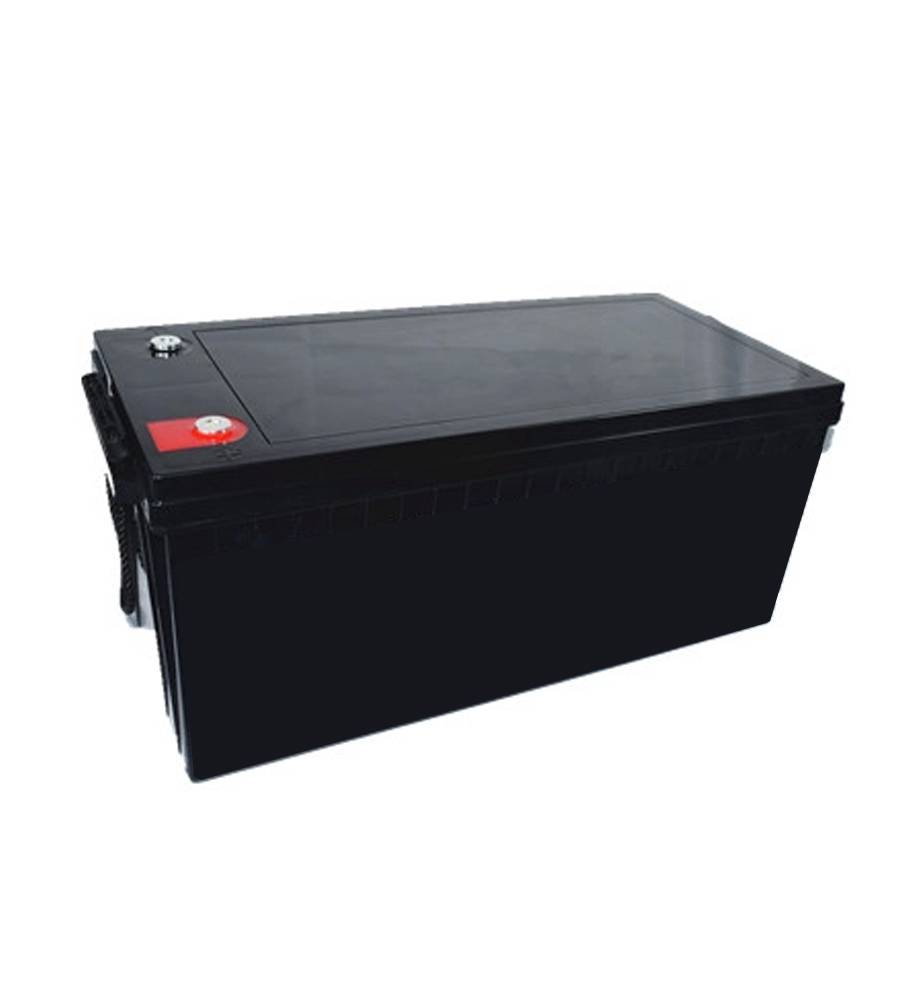
Various applications require these batteries, including electric vehicles, bicycles, scooters, solar energy storage systems, portable power stations, and backup power sources.
A 50Ah battery offers significant energy storage, enabling prolonged use in industrial, commercial, and residential applications. A 60V voltage rating allows these batteries to power devices requiring higher voltages, making them versatile and useful.
The 60V 50Ah lithium battery provides a reliable, efficient energy solution suitable for a wide range of demanding applications.
Also check: 60V 50Ah Lithium LiFePO4 Battery (Side Terminal) version
Where can you use a 60V 50Ah battery?
A 60V 50Ah battery finds versatile use in electric vehicles, solar energy storage, portable power stations, backup supplies for homes and businesses, and industrial applications. It serves as a reliable power source, ensuring uninterrupted operation and energy independence in various residential and commercial settings.
- Electric Vehicles: These batteries are commonly used in electric cars, motorcycles, scooters, and bicycles to power their motors and provide propulsion.
- Solar Energy Storage Systems: They are employed in solar energy storage setups to store excess energy generated by solar panels during the day for use during periods of low sunlight or at night.
- Portable Power Stations: 60V 50Ah batteries can be integrated into portable power stations to provide on-the-go power for camping, outdoor activities, or emergency situations.
- Backup Power Supplies: They serve as backup power supplies for homes, businesses, and critical facilities to ensure continuous operation during power outages or emergencies.
- Industrial and Commercial Applications: These batteries find use in various industrial and commercial applications, such as powering electric tools, machinery, and equipment.
- Uninterruptible Power Supplies (UPS): In UPS units, 60V 50Ah batteries serve as backup power sources to provide uninterrupted power supply to critical systems in the event of a power outage.
Overall, a 60V 50Ah battery offers versatile and reliable power solutions for both residential and commercial applications, ensuring continuous operation and energy independence.
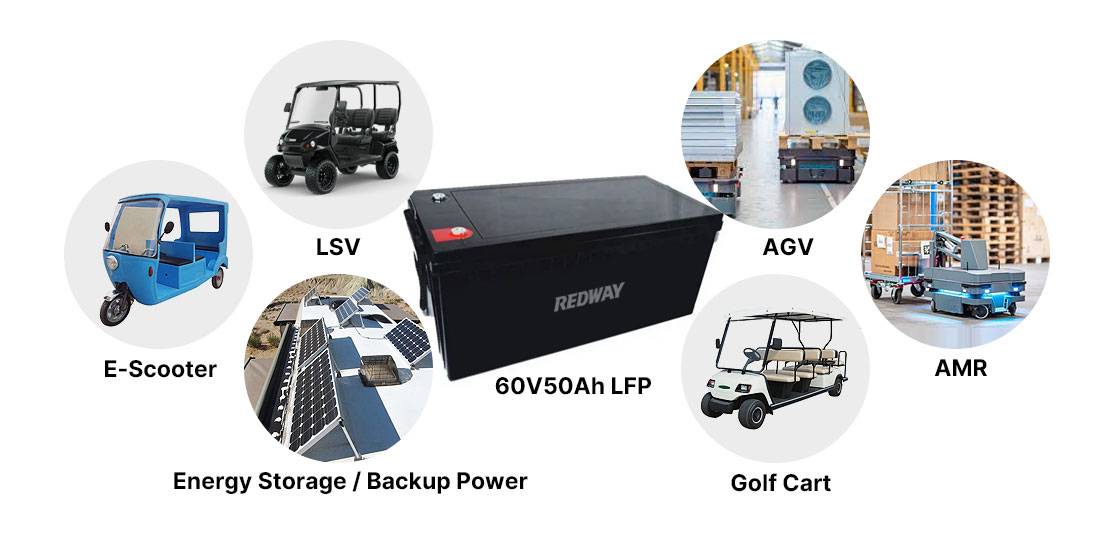
Advantages of a 60V 50Ah lithium-ion battery
A 60V 50Ah lithium-ion battery offers superior advantages over traditional lead-acid batteries. With higher energy density, longer cycle life, efficient charging, lower self-discharge rate, and minimal maintenance, it's ideal for diverse residential and commercial applications, providing reliable and efficient power solutions.
- Higher Energy Density: Lithium-ion batteries have a higher energy density, providing more power in a compact and lightweight design, ideal for applications with limited space.
- Longer Cycle Life: They boast a longer cycle life compared to lead-acid batteries, ensuring reliable performance over time and reducing maintenance and replacement costs.
- Efficient Charging: Lithium-ion batteries charge more efficiently, enabling quick replenishment of stored energy and enhancing usability.
- Lower Self-Discharge Rate: These batteries have a lower self-discharge rate, preserving stored energy for longer durations and making them suitable for standby use.
- Minimal Maintenance: With minimal maintenance requirements, lithium-ion batteries offer convenience and cost-effectiveness over their lifespan.
Overall, these advantages position the 60V 50Ah lithium-ion battery as a superior energy storage solution for various residential and commercial applications, meeting the needs of users seeking reliable and efficient power solutions.
Disadvantages of a 60V 50Ah lithium battery
The disadvantages of a 60V 50Ah lithium battery include capacity degradation over time, potential battery swelling issues, the risk of explosion from overheating or overcharging, and a limited lifespan despite their overall advantages.
- Degradation: Capacity loss over time due to cycling and external factors.
- Battery Swelling: Can occur due to various issues, potentially affecting safety.
- Risk of Explosion: Overheating or overcharging may lead to hazardous situations.
- Limited Lifespan: Despite advantages, lithium-ion batteries have a finite cycle life.
How long will a 60V 50Ah battery last if fully charged?
To estimate the duration of a fully charged 60V 50Ah battery, consider the load it powers. For example, if the load draws a constant current of 1 Amp, the battery would last for 50 hours (50Ah / 1A = 50 hours). Actual usage patterns, temperature, and maintenance routines can influence the battery's lifespan and performance.
To estimate the duration:
- Determine the Load Current: The average current drawn by the load connected to the battery is needed. Without this information, a general example can be provided.
- Calculation: For instance, if the load draws a constant current of 1 Amp, the battery would last for 50 hours (50Ah / 1A = 50 hours).
It's important to note that actual usage patterns, temperature, charging habits, and maintenance routines can affect the battery's lifespan and performance.
How is a deep cycle 60V 50Ah lithium battery better than a deep cycle lead-acid battery?
A deep cycle 60V 50Ah lithium battery surpasses lead-acid counterparts with a longer lifespan, consistent capacity retention, stable power delivery, lightweight design, and higher efficiency. It endures ten times more cycles, maintains capacity under high discharge rates, delivers stable power output, and is lighter and more efficient.
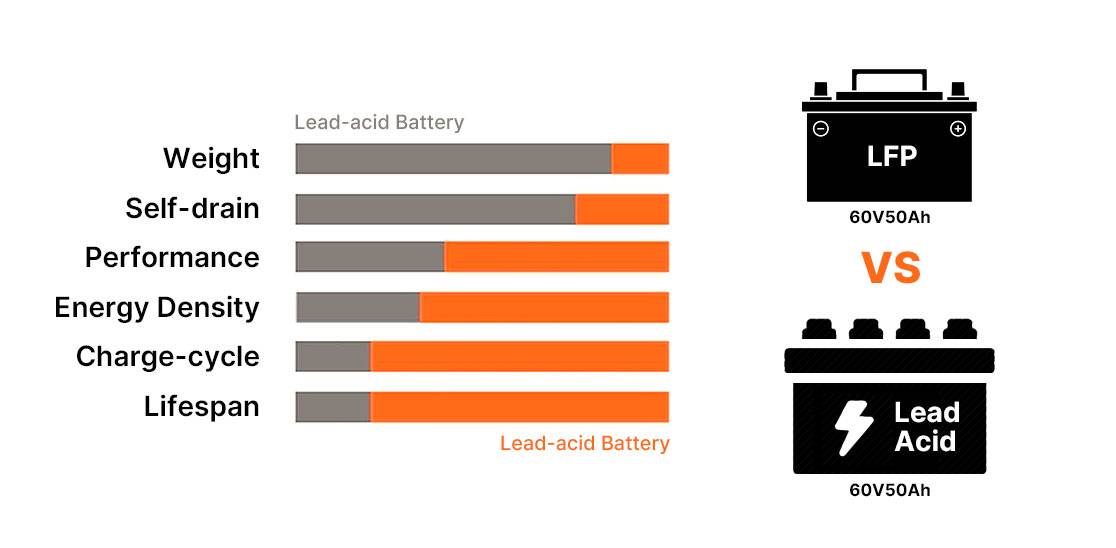
- Longer Lifespan: Lithium-ion batteries have a significantly longer lifespan, enduring approximately ten times more charge-discharge cycles compared to lead-acid batteries.
- Consistent Capacity: Lithium batteries maintain their capacity even at high discharge rates, ensuring consistent performance and efficiency throughout their lifespan.
- Stable Power Delivery: Lithium-ion batteries deliver stable and constant power output throughout the discharge cycle, whereas lead-acid batteries may experience fluctuations in power delivery.
- Lightweight and Compact: Lithium batteries are lighter and more compact than lead-acid batteries, making them ideal for weight-sensitive applications and installations where space is limited.
- Higher Efficiency: Lithium-ion batteries are more efficient in terms of energy conversion and storage compared to lead-acid batteries, resulting in improved overall performance and longer operating times.
In summary, a deep cycle 60V 50Ah lithium battery surpasses a deep cycle lead-acid battery in terms of lifespan, capacity retention, power delivery, weight, and efficiency, making it a superior choice for various applications requiring reliable and long-lasting power sources.
What are the quality standards for 60V 50Ah lithium battery manufacturing?
Manufacturers uphold various quality standards for 60V 50Ah lithium batteries, including ISO 9001, ISO 14001, UL, CE, and IEC 62133. Stringent manufacturing processes and rigorous testing ensure reliability, safety, and compliance, providing users with high-quality and dependable batteries.
- Adherence to International Standards:Compliance with globally recognized standards like ISO 9001 for quality management systems and ISO 14001 for environmental management ensures consistent quality, process improvement, and environmental responsibility throughout manufacturing.
- Certifications for Safety and Compliance:Obtaining certifications from regulatory bodies such as UL or CE demonstrates compliance with safety and product standards in specific regions, validating the battery's safety, performance, and regulatory compliance.
- Rigorous Testing Procedures:Subjecting the battery to rigorous testing, including the IEC 62133 test, assesses safety aspects such as electrical, mechanical, and thermal properties to prevent short-circuiting during transportation and use, ensuring safety and reliability.
- Stringent Manufacturing Processes:Implementing stringent manufacturing processes maintains consistency, quality, and reliability throughout production. This involves using high-quality materials, advanced techniques, and rigorous quality control measures to ensure the battery's integrity.
- Comprehensive Quality Control Measures:Implementing thorough quality control measures at every production stage ensures the battery's quality and performance. Regular inspections, testing, and validation of critical parameters identify and address potential issues or deviations from specifications.
By adhering to these quality standards, manufacturers ensure that 60V 50Ah lithium batteries meet industry requirements, guaranteeing users reliable performance, safety, and compliance.
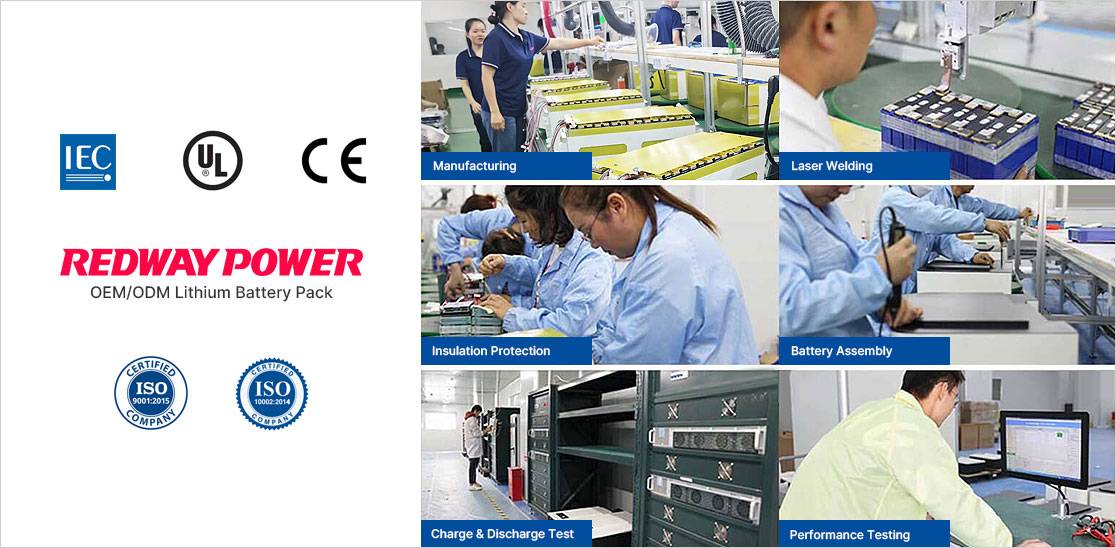
Is it safer to use a 60V 50Ah lithium-ion battery in small size vehicles?
Yes. Using a 60V 50Ah lithium-ion battery in small vehicles is safer and more efficient. With stable chemistry and compact design, it offers longer driving ranges and requires minimal maintenance compared to lead-acid batteries. Enjoy consistent performance and reduced risk of leaks or spills.
- Safety:
- Lithium-ion batteriesare generally safer due to their stable chemistry and built-in safety features.
- They have a lower risk of leakage, acid spills, and sulfation compared to lead-acid batteries.
- However, proper handling, charging, and storage practices are essential to maintain safety.
- Weight and Space:
- Lithium-ion batteriesare significantly lighter and more compact than lead-acid batteries.
- In small vehicles, weight reduction is crucial for efficiency and performance.
- Energy Density:
- Lithium-ion batterieshave a higher energy density, meaning they store more energy in a smaller volume.
- This allows for longer driving ranges without adding excessive weight.
- Cycle Life:
- Lithium-ion batteriestypically offer more cycles (charge-discharge cycles) before capacity degradation.
- For small vehicles, this means longer-lasting power.
- Maintenance:
- Lithium-ion batteriesrequire minimal maintenance compared to lead-acid batteries.
- No need for regular water refilling or equalization charges.
- Voltage Stability:
- Lithium-ion batteriesmaintain a stable voltage throughout the discharge cycle, providing consistent performance.
- Lead-acid batteries exhibit voltage fluctuations during discharge.
Remember that safety precautions are crucial regardless of the battery type. Always follow manufacturer guidelines, handle batteries carefully, and ensure proper installation. Consult with experts to choose the best battery for your specific small vehicle application.
What are the features of a 60V 50Ah lithium-ion battery?
The features of a 60V 50Ah lithium-ion battery include higher energy density, longer lifespan, efficient charging, stable power delivery, lightweight design, lower self-discharge rate, and minimal maintenance. It's ideal for various applications like electric vehicles, solar energy storage, and backup power supplies, ensuring reliability and versatility.
What are the specifications of a 60V 50Ah lithium-ion battery?
The specifications of a 60V 50Ah lithium-ion battery include a voltage of 60 volts and a capacity of 50 ampere-hours (Ah). Utilizing lithium iron phosphate (LiFePO4) chemistry ensures stability and longevity, making it suitable for electric vehicles, solar energy storage, and backup power systems.
How to maintain a 60V 50Ah lithium-ion battery?
To maintain a 60V 50Ah lithium-ion battery, follow these steps:
- Charge properly using a compatible charger.
- Employ partial discharge cycles and maintain around 5% charge monthly.
- Keep the battery within 5°C to 20°C (41°F to 68°F).
- Store batteries at 50% capacity and check every 2-3 months for charge retention.
How long does a 60V 50Ah LiFePO4 Lithium Battery last?
A 60V 50Ah LiFePO4 Lithium Battery typically lasts between 2,000 to 5,000 charge cycles, depending on usage and maintenance conditions.
Can the 60V 50Ah LiFePO4 Lithium Battery be charged with a regular charger?
No, the 60V 50Ah LiFePO4 Lithium Battery requires a charger specifically designed for LiFePO4 chemistry to ensure proper charging voltage and current, and to protect the battery's longevity and performance.
How does the 60V Lithium Battery Charger enhance the performance of LiFePO4 batteries?
The 60V Lithium Battery Charger is designed to match the specific charging profile of LiFePO4 batteries, optimizing charge efficiency, maintaining battery health, and extending overall battery life.
What is the waterproof level of the 60V 50Ah LiFePO4 Lithium Battery?
The waterproof level of the 60V 50Ah LiFePO4 Lithium Battery varies by model, but many are rated to at least IP54, meaning they are protected against dust ingress and water splashes from any direction.
What materials are used for the battery shell of the 60V 50Ah LiFePO4 Lithium Battery?
The battery shell of the 60V 50Ah LiFePO4 Lithium Battery is typically made from high-strength materials such as aluminum or rugged plastic to provide durability and protection.
What communication protocols are supported by the 60V 50Ah LiFePO4 Lithium Battery?
The 60V 50Ah LiFePO4 Lithium Battery may support communication protocols such as CAN bus, RS485, or proprietary communication systems for integration with monitoring systems and other battery management technologies.














